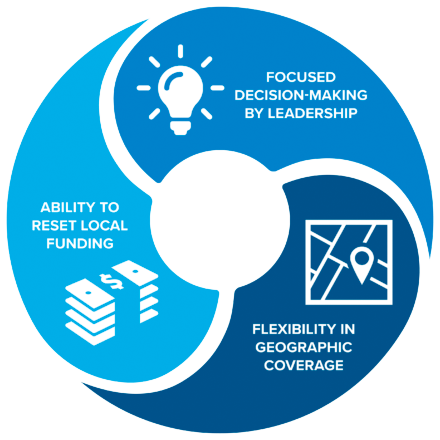Regardless of size or location, 2020 through 2023 has yielded unprecedented challenges for transit agencies:
- Changes in commuting patterns have caused declines in ridership;
- Increased costs for everything from labor to fuel;
- Scarcity of tax revenues.
Municipal transit agencies must also compete for local dollars against other critical services, including police and fire, schools, parks, and recreation.
Transit agency managers and governing boards are looking for options that elevate transit as a local priority and have been asking more frequently if a standalone organizational structure in the form of an authority is a viable option. Agencies are seeing potential benefits of:
Focused decision-making by leadership

Under the city or county organization, decision-makers need to balance investment priorities between each of the departments that provide services from public safety to schools to infrastructure. A transit authority board has one responsibility—ensuring sustainability of the public transportation network, including operations, maintenance, planning, and funding.
Flexibility in geographic coverage
Municipal organizations are typically restricted to service within the city limits, unless agreements with surrounding areas are established. These agreements are becoming increasingly difficult as the level of service is typically lower than in the denser areas and costs are escalating. An authority can be organized corresponding to city borders, county borders, townships, or other political subdivision boundaries, such as voting precincts depending on State legislation.
Ability to reset local funding
Limitations on maximum annual tax increases laws exist in many municipalities that make it difficult to balance budgets in periods of increasing costs. Overhauling the governance structure to migrate to an authority has offered agencies the ability to re-establish the amount of revenue generated locally and, in many cases, the annual cost escalation rate restrictions have been relaxed for at least a short period.
Converting to an Alternate Governing Structure
SRF’s Transit team has guided agencies and municipal staff through the complex world of conversion to an authority throughout the Midwest. Through these efforts we have expanded our understanding of the opportunities and challenges agencies will likely encounter as they consider and act on transitioning to an alternate governance form.
For a successful conversion, transit agencies should be prepared to dedicate adequate time and resources to the following:
- Conducting a comprehensive review of current conditions so that a well-informed decision regarding the need to make a change exists or whether certain aspects of the current structure can be refined to address issues.
- Defining a range of alternate governance actions, from establishing consistent understanding of roles and responsibilities through memoranda of understanding/joint powers agreement to authorities.
- Documenting the financial implications of making a change from the current structure to alternative structures, including transit authorities.
- Ensuring key steps are taken to make a change, including review of state enabling legislation, selecting the authority governance model, setting logical and financially stable boundaries, documenting the cost structure and funding levels needed, and addressing staffing.
- Assessing the financial needs to support a governance change and allocation of cost in an efficient manner.
- Documenting steps to implementation, such as setting up articles of incorporation, agency bylaws, and transition plans.
- Assessing the impacts on current service associated with opt-ins or opt-outs.
How can SRF help?
With technical and public engagement expertise in all the tasks outlined above, SRF’s team of planners and analysts will help your agency carefully examine your current system, develop a comprehensive roadmap for the conversion process, and assess impacts and financial needs. We are dedicated to helping communities provide equitable access to transit facilities by working with project sponsors and FTA to advance projects and increase sustainable transportation in the US.
Contact Bill Troe or Joseph Kapper for more information.

402.513.2158
Bill has more than 38 years of regional, subarea, and multimodal corridor transportation planning experience. Through his work from project conceptualization through implementation, he understands how local tools and transportation and land use conditions can work in concert to develop technically feasible solutions for a community. Bill’s areas of practice include regional transit planning, transit and roadway corridor planning, and multimodal subarea planning.

651.333.4136
Joseph is a planner and project manager with a broad background in transportation policy analysis, transit planning, community development, and effective public program and project delivery. As a member of SRF’s Transit Planning practice, his focus areas include leading strategic planning efforts for transit agencies, transit service and operations planning, university campus transit planning, state and federal compliance, Americans with Disabilities Act (ADA) planning, and community engagement.

